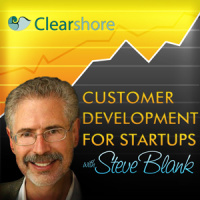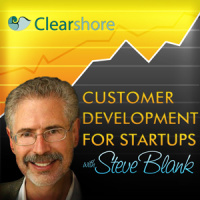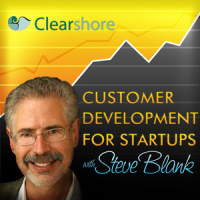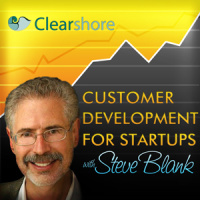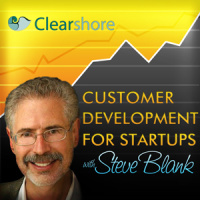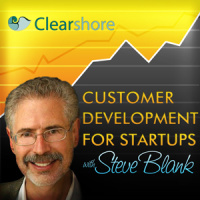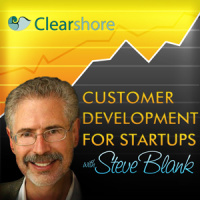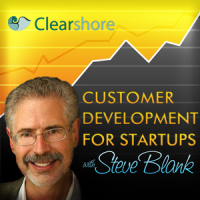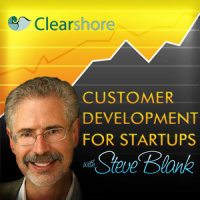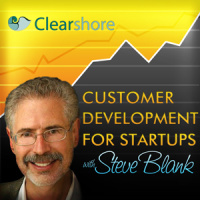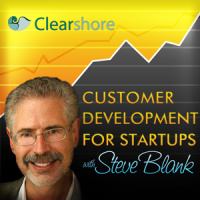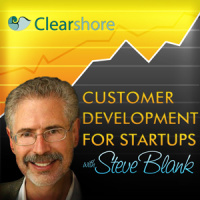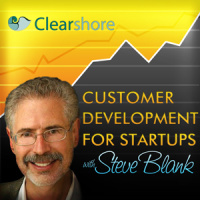Sinopsis
Visor Labs engineers mobile customers
Episodios
-
Startup Ethics: Albatross or Essential?
17/02/2025 Duración: 03minStartup Ethics: Albatross or Essential? by Steve Blank
-
-
SuperMac War Story 10: The Video Spigot
14/02/2025 Duración: 09minI was lucky to have been standing in the right place when video became part of the Macintosh. And I got to experience a type of customer buying behavior I had never seen before – the Novelty Effect.
-
SuperMac War Story 9: Sales, Not Awards
13/02/2025 Duración: 07minWhile this story is about my experience in packaging for computer retail channels, if you substitute the word “web site” for retail, you’ll get the idea why these lessons were timeless for me.
-
Supermac War Story 8: Cats and Dogs – Admitting a Mistake
12/02/2025 Duración: 03minAt SuperMac, I thought I was good VP of marketing; aggressive, relentless and would take no prisoners – even with my peers inside the company. But a series of Zen-like moments helped me move to a different level that changed how I operated. It didn’t make my marketing skills any worse or better, but moved me to play forever on a different field.
-
SuperMac War Story 7: Rabbits Out of the Hat – Product Line Extensions
10/02/2025 Duración: 09minA year after we started repositioning the company, Engineering, which had been working on a family of new products literally for years, came to deliver some good news and bad news.
-
SuperMac War Story 5: Strategy versus Relentless Tactical Execution — the Potrero Benchmarks
09/02/2025 Duración: 11minSuperMac War Story 5: Strategy versus Relentless Tactical Execution — the Potrero Benchmarks by Steve Blank
-
How to Flip the Script, Beat China and Russia – And Fix the Broken Department of Defense
10/12/2024 Duración: 13minIn WW II, the U.S. outsourced advanced weapons systems development to civilians. The weapons they developed won the war. It’s time to do that again. This new administration can make it happen.
-
Quantum Computing – An Update
23/10/2024 Duración: 16minIn March 2022 I wrote a description of the Quantum Technology Ecosystem. I thought this would be a good time to check in on the progress of building a quantum computer and explain more of the basics.
-
How Saboteurs Threaten Innovation–and What to Do About It
11/10/2024 Duración: 15min“Only the Paranoid Survive” Andy Grove – Intel CEO 1987-1998 I just had an urgent “can we meet today?” coffee with Rohan, an ex-student. His three-year-old startup had been slapped with a notice of patent infringement from a Fortune 500 company. “My lawyers said defending this suit could cost $500,000 just for discovery, and potentially millions of dollars if it goes to trial. Do you have any ideas?”
-
What Does Product Market Fit Sound Like? This.
08/10/2024 Duración: 02minWhat Does Product Market Fit Sound Like? This. by Steve Blank
-
How To Find Your Customer In the Dept of Defense – The Directory of DoD Program Executive Offices
19/09/2024 Duración: 06minFinding a customer for your product in the Department of Defense is hard: Who should you talk to? How do you get their attention? Looking for DoD customers? How do you know if they have money to spend on your product? It almost always starts with a Program Executive Office.
-
Security Clearances at the Speed of Startups
15/08/2024 Duración: 05minImagine you got a job offer from a company but weren’t allowed to start work – or get paid – for almost a year. And if you can’t pass a security clearance your offer is rescinded. Or you get offered an internship but can’t work on the most interesting part of the project. Sounds like a nonstarter. Well that’s the current process if you want to work for companies or government agencies that work on classified programs.
-
Why Large Organizations Struggle With Disruption, and What to Do About It
13/08/2024 Duración: 18minSeemingly overnight, disruption has allowed challengers to threaten the dominance of companies and government agencies as many of their existing systems have now been leapfrogged. How an organization reacts to this type of disruption determines whether they adapt or die.
-
Lean LaunchPad @Stanford 2024 – 8 Teams In, 8 Companies Out
02/07/2024 Duración: 08minWe just finished the 14th annual Lean LaunchPad class at Stanford. The class had gotten so popular that in 2021 we started teaching it in both the winter and spring sessions. During the quarter the eight teams spoke to 919 potential customers, beneficiaries and regulators. Most students spent 15-20 hours a week on the class, about double that of a normal class. In the 14 years we’ve been teaching the class, we had something that has never happened before – all eight teams in this cohort have decided to start a company.
-
Hacking for Defense @ Stanford 2024 – Lessons Learned Presentations
26/06/2024 Duración: 18minWe just finished our 9th annual Hacking for Defense class at Stanford. What a year.
-
Gordon Bell R.I.P.
29/05/2024 Duración: 05minGordon Bell passed on this month. I was a latecomer in Gordon Bell’s life. But he made a lasting impact on mine.
-
Secret History – When Kodak Went to War with Polaroid
19/05/2024 Duración: 19minKodak and Polaroid, the two most famous camera companies of the 20th century, had a great partnership for 20+ years. Then in an inexplicable turnabout Kodak decided to destroy Polaroid’s business. To this day, every story of why Kodak went to war with Polaroid is wrong. The real reason can be found in the highly classified world of overhead reconnaissance satellites. Here’s the real story.
-
The Secret History of Polaroid CEO Edwin Land
18/05/2024 Duración: 09minThe connections between the world of national security and commercial companies still has surprises.
-
Founders Need to Be Ruthless When Chasing Deals
17/04/2024 Duración: 08minOne of the most exciting things a startup CEO in a business-to-business market can hear from a potential customer is, “We’re excited. When can you come back and show us a prototype?” This can be the beginning of a profitable customer relationship or a disappointing sinkhole of wasted time, money, resources, and a demoralized engineering team. It all depends on one question every startup CEO needs to ask.

